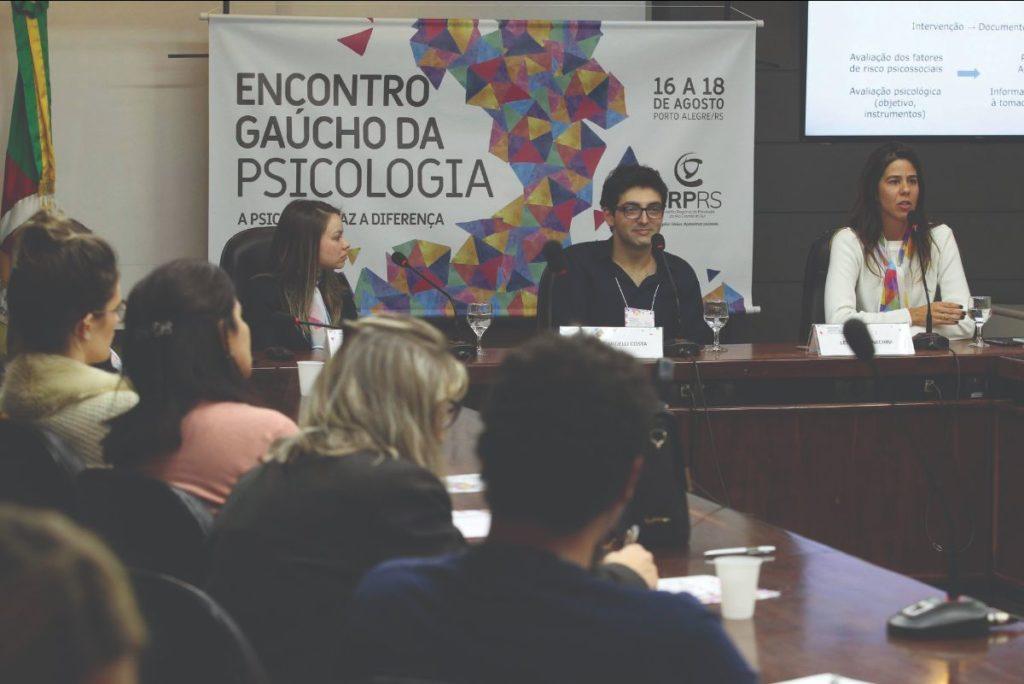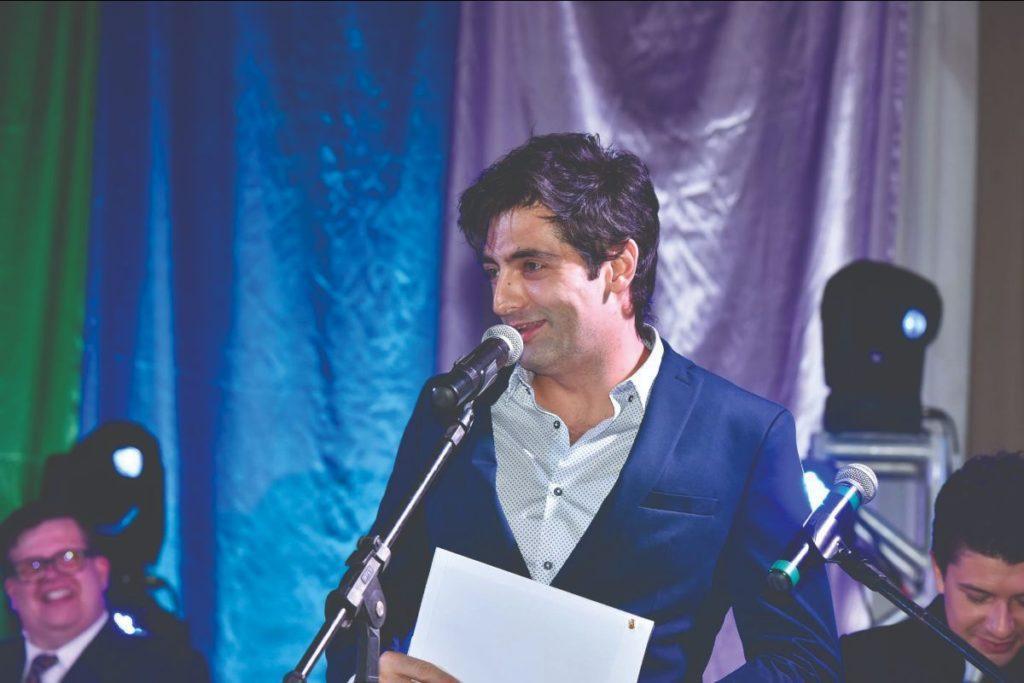First Person
Careers Up Close: Angelo Brandelli Costa on Prejudice, Sexuality, and the Health of the LGBTQ+ Population

Photo Above: In this 2018 photo, taken at a regional meeting of Brazil’s Federal Council of Psychology, Angelo Brandelli Costa is presenting on the
psychological mental health care available to transgender people and gender-diverse people in Brazil and internationally.
Angelo Brandelli Costa is an associate professor of social psychology at the Graduate Program in Psychology, the Graduate Program in Social Sciences, and the Graduate Program in Medicine and Health Sciences at the Pontifical Catholic University of Rio Grande do Sul. His research in social and health psychology has an emphasis on prejudice, sexuality, gender, HIV/AIDS, and the health of the LGBT+ population.
Current role: Associate professor of social psychology at the Pontifical Catholic University of Rio Grande do Sul, 2016–present
Previously: Researcher and assistant professor, Universidade Federal do Rio Grande do Sul, 2010–2016
Terminal degree: PhD in psychology from Universidade Federal do Rio Grande do Sul, 2015
Recognized as APS Rising Star in 2017
Sparking his interest
My choice to work on prejudice toward LGBTQ+ people was a mixture of the need that presented itself in Brazil at the time, the influence of my mentors, and my intention to provide a technical answer to the barriers I was facing as a gay psychologist in training.
When I was an undergraduate psychology student, LGBTQ+ themes were treated in the curriculum in an exotic, pathologizing way. I vividly remember an episode in which a professor told me that research on these topics should take place within the scope of individual psychotherapy and not at the university.
By the time I graduated, these topics were starting to gain traction in Brazil with the Supreme Court’s approval of same-sex marriage and the implementation of related public policies. Professor Henrique Nardi, from the Federal University of Rio Grande do Sul Social Psychology Graduate Program, invited me to collaborate with him to evaluate prejudice against sexual and gender diversity in secondary school contexts. Until then, social psychology work in Brazil dealt with LGBTQ+ themes mostly within gender studies and within a critical psychology framework.
At that time, I was more interested in bringing to Brazil the traditional psychological study of attitudes that had been underway in the United States since the 1970s. This approach was a novelty. Later, I emphasized the impact of prejudice on its victims based on my professional experience outside academia, working on social movements and public policies and under the mentorship of professor Silvia Koller.
Getting started
Before my first job as a professor, I worked as a consultant on projects related to HIV/AIDS and LGBTQ+ issues at the United Nations. This focus has been a constant in my career, even when I did a split-PhD program at City University of New York Hunter College while working at the United Nations Development Programme (UNDP) headquarters in New York City. I still work as a consultant to the Joint United Nations Programme on HIV/AIDS (UNAIDS), coordinating the scientific branch of the People Living With HIV Stigma Index in Brazil, which is a national community-based survey of the impact of HIV-related stigma on HIV-positive people. I try to bridge the worlds of academia and public policies, seeking to implement evidence-based policies, for example, and basing my research on the needs of the communities I have worked with.
Moving up
Unlike in the Global North, it is quite common in Brazil for professors to work in universities that are their alma mater. Right after I finished my PhD and did my training at the Federal University of Rio Grande do Sul, I worked there for a brief period as a substitute professor of the history of psychology.
Luckily, there was an open position for a professor in social psychology at the Pontifical Catholic University of Rio Grande do Sul. Although I was a young researcher, I was hired in a tenure-track position. I had the opportunity to create my research group—Prejudice, Vulnerability and Psychosocial Processes—and great freedom to set up my line of work in the field of social psychology. I was also lucky to have a large group of very talented students working with me right from the start.
By 2017, when I received the APS Rising Star award, I was finishing research on healthcare needs and barriers to accessing healthcare among LGBTQ+ populations. This concerned both transgender people’s needs for gender affirmation procedures and HIV care, for example. Although intricately linked to medicine and public health, our idea has always been to use psychological models to bridge public health and psychology. We use the minority stress model, which is based on the idea that discrimination can cause people to anticipate future prejudice and avoid services as a result.
Advancing understanding and acceptance
My research has positively influenced health policies related to the LGBTQ+ population in Brazil. For example, as a consultant for UNESCO (the United Nations Educational, Scientific and Cultural Organization), I created and was the first coordinator of a health policy for the LGBTQ+ population in my state. In this policy, we implemented an evidence-based massive online course to train and reduce prejudice among healthcare personnel. The course’s effectiveness has been documented, and we are now adapting it for educators.
My group is now expanding our investigations of mental health and general health among LGBTQ+ populations. For example, several manuscripts in development explore discrimination in gynecological care, social identity, intersectionality, and minority stress among women who have sex with women.
In addition, we have projects on LGBTQ+ youth, especially trans and gender-diverse youth, and how they are impacted by gender affirmation practices. This work embraces the interface between social and developmental psychology.
I was also part of a recent World Health Organization working group that assessed the new ICD-11 (International Classification of Diseases, 11th edition) diagnostic criteria for gender incongruence in Brazil. We are making a significant effort to provide empirical support for depathologization and stigma reduction among trans and gender-diverse people.
We are starting, in partnership with UNAIDS and various community organizations, the second wave of the People Living With HIV Stigma Index Brazil.
Another focus concerns political psychology. With the expansion of authoritarian discourses and practices in Brazil, several students came to me to start a line of work in this field. We are adapting classic measures of right-wing authoritarianism and social dominance orientation, among others, and studying the phenomenon of authoritarianism and the (lack of) political participation in the context of prejudice and sexual and gender diversity.
By invitation of a group from the computer science program, I am now contributing to projects that assess patterns from personality and social psychology models and in video sequences of crowds and crowd simulations. For the next step in this novel line of work, we are including gender diversity discrimination.
Motivating early-career scientists
I have a large group of master’s and doctoral students, as well as postdoctoral and scientific initiation candidates, which in Brazil is a modality where undergraduate students actively work in research groups. They come mostly from the social sciences, psychology, and medicine programs that I teach. This interdisciplinary climate is important to advancing the kind of work we are doing. I also like to create an open working climate, leaving students free to take part in large projects that are underway or to start new lines of work that will add to what the group is already developing. Something like this happened recently when, based on student demand, we incorporated models from our political psychology work into our work on prejudice.
I like my students to subvert what I’m researching. Our roles as mentors should be to support demands for novelty, pointing to a future generation that surpasses in every way what we are developing now.
When we are in training, we are expected to stick to our mentors’ theories, scientific problems, and best ways of researching. My advice is a little different from that. I think it is fundamental to try to respond to the concrete demands of the communities around us and of which we are a part. This provides an endless source of ideas on what to do and how to positively influence societal development.
I strongly believe that psychological science, even at its most basic, should be a way to operationalize and answer these demands.
Always something new
I like the sense of newness in my work. We are always meeting new students who propose new questions. In teaching, the fact that we constantly revisit what we believe gives me great enthusiasm. We are never stagnant in academia.
Being able to work with nongovernmental organizations, the United Nations, health services, and other stakeholders also energizes me. The relationship between academia, society, and implementation encourages me to keep going. Building these bridges and putting actions in motion based on what psychological science can offer gets me out of bed every day.
What is the biggest challenge you have encountered in your career so far?
We face the dismantling of science and education policy in Brazil by the current federal administration. This means a lack of funding in science and higher education.
More than that, there is a climate of devaluation of teaching and research that contaminates the entire academy as well as future students. Bright professors are leaving the country, and there is a noticeable decrease in the number of students seeking scientific careers, which is a disaster for a country that still has a dearth of people with advanced scientific training and where science still can and must answer many social problems.

What are your plans for the future?
I recently returned from serving as a visiting professor at Sapienza University in Rome. This time in Italy supported my interest in expanding my internationalization not only in research but also in teaching and science communication. Relatedly, I am completing a book about the history of research on prejudice, to be titled The Reason of Prejudice.
We recently created, together with colleagues from Chile, Uruguay, Peru, and other Latin American countries, a network of researchers on topics of applied psychology and the LGBTQ+ population. I am also finishing my involvement as a young leader at the APA Global Learning Leadership Institute and Global Psychology Alliance. This experience has been particularly important in my pursuit of internationalization.
Feedback on this article? Email apsobserver@psychologicalscience.org or scroll down to comment.





APS regularly opens certain online articles for discussion on our website. Effective February 2021, you must be a logged-in APS member to post comments. By posting a comment, you agree to our Community Guidelines and the display of your profile information, including your name and affiliation. Any opinions, findings, conclusions, or recommendations present in article comments are those of the writers and do not necessarily reflect the views of APS or the article’s author. For more information, please see our Community Guidelines.
Please login with your APS account to comment.